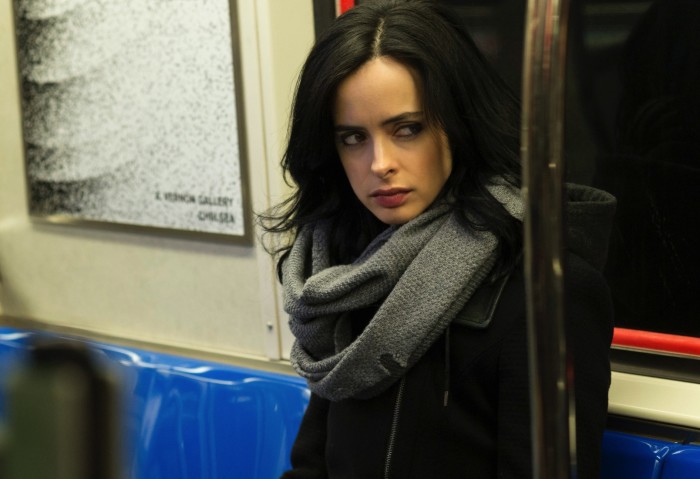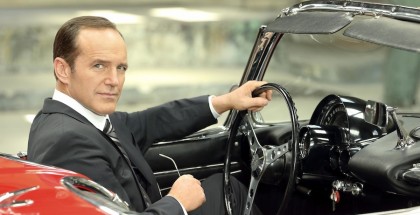Why you should catch up with Jessica Jones
Review Overview
Krysten Ritter
10People who aren't Krysten Ritter
6Krysten Ritter, again
10Clarisse Loughrey | On 14, Nov 2015
This spoiler-free review is based on the first half of Season 1.
The single-minded conqueror has never fared too well in the annals of history; that kind of stubborn forward momentum breeds only bloated empires and sagging borders. Alexander’s resolve to cross India’s Hyphasis River – and onwards, to the end of his known world – was met only with mutiny; Napoleon’s embittered retreat crossed back over fields of the 380,000 French dead who had fallen under his foolish ambitions to master a wintry Russia. Dogged determination invites weakness as much as it does strength; one must adapt to thrive, or risk finding oneself far from home with feet too bruised and wearied to take another step.
At the time of writing this review, Marvel’s just about one step away from Napoleonic disaster. With each new level of contextual embroidery, with each new tie-in to its shared universe, we’re collectively being driven into a snowbank of mythological muddle. This year’s cinematic outputs have betrayed the weakening of individual stories in favour of this unfaltering obsession with the connective tissue of the MCU. With the studio about to launch into Phase 3 with next year’s Civil War, it’s natural to be worried that Marvel will reach a point of no return, where its universe will become too complex to allow for individual storytelling, yet too established to back away from.
That said, Marvel’s not entirely without an escape route, putting it in the odd position of potentially becoming a better candidate for world domination than the pro-stylings of the Alexander dude we all felt inclined to nickname “The Great”. It’s a powerhouse starting to recognise the benefits of diversifying its tactics; not to blindly power onwards in its cinematic schedule, but to seek the momentous advantages offered by the small screen.
Where Daredevil utilised the destruction unleashed on New York during the first Avengers film as the stirring point for its criminal underworld, Marvel’s new series Jessica Jones takes an even more radical step in dissociating itself from the MCU. Which is certainly surprising for a company so obsessed with its own synergy. With only a glimpse at the first seven episodes of the first season, there’s no certainty there won’t be a more explicit tie-in towards the series finale, but things so far have been pared down to only the most oblique of references to the “big green dude and his crew”.
Jessica Jones does admittedly betray some of the studio’s usual tactics in its initial application of an established genre (Cold War thriller, space opera) to the MCU as a form of individual differentiation. Here, we’re offered gumshoe vibes in the breezy jazz score and in morsels of dialogue like: “I’m just trying to make a goddamned living in this goddamned city.” Yet much of that tone gradually crumbles away, as the series progresses in a way that fits it comfortably within television’s mainstays of character dramas: Jessica Jones is a show with the potential to engage regulars to The Good Wife just as much the hard-core comics set.

David Tennant as Kilgrave.
That’s thanks, primarily, to the fact that Jones (Krysten Ritter) is a character defined primarily by factors that exist outside of her own superpowers. Her unnatural strength, her ability to jump several stories high; these aren’t the driving force behind her actions, they’re last resorts utilised only when every other option has run out, which doesn’t appear to be too often in her daily existence as a private investigator tasked with snapping pictures of adulterers. That, or they’re the half-hushed secret shared between herself and the series’ other major superhero, Luke Cage (Mike Colter).
Where Marvel so usually deals with the external, with heroes rising to their destinies and saving the day, Jessica Jones seems to almost entirely internalise its conflict. Everything is central to her, and Ritter’s brilliantly hardened, bitter performance as a woman on the run from her past. She’s a hard-drinker, outwardly cruel yet inwardly moral, in a gumshoe cliché played fresh by resting it on the shoulders of a female. It’s with Jones that Marvel is finally given space to explore something so rarely confronted in such depth: consequence. Culpability. Cinematic spectacle doesn’t allow for the moment spent with a passer-by caught in the Hulk’s rampage, yet we know that every hero, victim and villain, both through their own actions and those committed against them, create ripples of consequence that last well beyond the final reel.
In that sense, Jessica Jones plays almost as a post-script here, as she’s made to feel the after-effects of her own powers, her brief stint as a self-proclaimed superhero, and her traumatic shared history with the show’s main villain, Kilgrave (David Tennant). Most significantly, we become witness to her struggles with PTSD, the phantasmal lingering of Kilgrave’s abuse. Such direct evocation of the very frightening reality of abusive relationships marks one of the darkest places the MCU has journeyed emotionally, and though it may not be the most nuanced of explorations, there’s still something undoubtedly powerful in a super-powered woman repeating the idea that the consequences of abuse are never the victim’s fault. It’s the kind of simple act that may genuinely have positive effects on the lives of its viewers, and that shouldn’t go unappreciated.
In fact, Jessica Jones may be so focused on the psychological arch of its protagonist that the series’ supporting narratives do tend to feel fairly stilted in comparison; there’s little to engage with in the relationship trials of Jones’ employer (Carrie Anne-Moss) or the child star-past of her best friend, Trish (Rachael Taylor). Perhaps they’re worthy sacrifices, though. Marvel’s territorial expansion to the small screen has once more shown a depth of ingenuity, and creative spirit, which can now happily put to rest those nightmares of crumbling empires. This is one of Marvel’s smartest moves yet.
Jessica Jones is available on Netflix UK, as part of an £9.99 monthly subscription.
Where can I buy or rent Jessica Jones online in the UK?





















